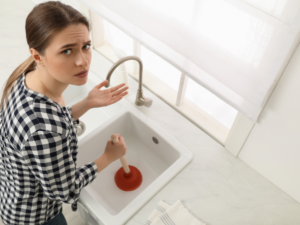 Even though you may be diligent about changing your air filter or having your home’s electrical systems inspected, it’s not uncommon for plumbing to wind up overlooked. But neglecting your plumbing issues is always a bad bet, leading to costly plumbing repairs and worse inconveniences down the line.
Even though you may be diligent about changing your air filter or having your home’s electrical systems inspected, it’s not uncommon for plumbing to wind up overlooked. But neglecting your plumbing issues is always a bad bet, leading to costly plumbing repairs and worse inconveniences down the line.
That’s why we at Benjamin Franklin have put together some valuable tips for understanding how seasonal storms pose a special threat to your home’s plumbing system.
How Seasonal Storms Impact Plumbing in Niceville, FL
Florida homeowners are all too familiar with how hurricanes bring in storm surges and flooding, but the one hidden danger that often goes unnoticed until it’s too late is how they impact your plumbing. Even Niceville’s storms can wreak serious havoc on pipes, drains, and water quality!
1. Saltwater in Pipes
Hurricanes usually bring saltwater from the ocean into the land and then flood into systems that weren’t designed to withstand the high salt content. If that happens to your home, it can lead to accelerated corrosion and contaminate the water quality.
2. Pipe Leaking
The storm season puts enormous pressure on the ground under your house, which could lead to pipe shifts and leaks. Even small pipe breaks can lead to slab leaks, potentially weakening the structure of your home.
3. Sewer Line Backups
Overtaxed Florida sewer lines typically struggle under the intensity of storm surges, and that can be a recipe for disaster in a flood. Sewage backups pose serious hazards due to pathogens and the potential for other long-term damage.
Rising Water Tables Can Back Up Your Drains
Imagine this scenario: You take a step onto your lawn after the rain and find it’s completely water-logged. It feels more like a swamp than a lawn, and there’s a musty odor in the air. This could be a sign that rising groundwater is overwhelming your septic system.
Septic systems need regular maintenance to function smoothly in every season, and the high water table that follows the stormy season can pose a threat to that balance:
- Soil saturation slows absorption: Drain fields need dry soil to break down waste; soaked soil can’t take in any more liquid.
- Tank flooding is possible: Rising water tables can seep into the septic tank, diluting the bacteria that breaks down waste.
- Backups can happen: When wastewater has nowhere to go, drain backup happens.
Heavy Rain Can Overwhelm Sewer Systems
The intensity of the storm season quickly turns its rains from a welcome relief to a potential disaster of plumbing problems.
In Niceville, backflow prevention devices are an absolute must. Without them, it’s easy to end up with sewage flowing back into your home once the plumbing system gets overloaded, especially during the storm season. Municipal sewer systems all experience excessive overflow of water, and it’s just not worth the risk.
There are a few common types of devices that work for this scenario:
- Sewer backflow valves
- Check valves
- Gate valves
However, backflow device installation is not a DIY job. It’s a delicate procedure that requires a professional’s touch, so hire a licensed plumber to handle the stress for you.
Septic Systems Struggle After Storms
Heavy rain and flooding cause all kinds of storm drainage problems for your septic systems. Excess water saturates the drain field, leading to potential system failure, and that’s an expensive problem to fix.
When the storms hit Niceville, residential septic tanks can struggle to handle the extra water, resulting in slow draining and foul odors. It can even contaminate other water sources nearby, so it’s crucial to understand how you can prevent these storm drainage issues.
A septic system has several parts to it:
- Pipes: They carry wastewater from your house to the tank.
- Tank: This buried container holds the wastewater.
- Drain field: Treated water is soaked into the soil.
Too much heavy rain and flooding causes major problems, leading to costly repairs.
What to Check After a Storm
The aftermath of a storm can seem overwhelming, and it’s important to find the problems that aren’t immediately invisible – namely, in your home’s plumbing system. Remember, that includes looking both inside and outside of your home.
1. Check for leaks
Even minor flooding can break a pipe. Look for signs of improper moisture or damp spots on the walls, ceilings, or floors.
2. Test the water pressure
Turn on the faucet and identify any that are behaving differently. Fluctuating or absent water pressure can indicate a blockage down the line.
3. Inspect the sewer lines
If water is draining slowly in the sink, tub, or toilet, there could be clogs or overflows in the sewer line.
4. Check the water heater
If your water heater was even partially submerged, have it inspected by a professional before using it again.
How to Protect Your Plumbing Before the Next Storm
Remember, preventive action is always the best defense.
With that in mind, here are some steps you can take to protect your plumbing a head of the stormy season:
- Inspect your plumbing and its current condition.
- Weatherproof your pipes where needed.
- Install backflow prevention devices.
- Anchor gutters and downspouts.
- Trim tree branches that might break or damage plumbing fixtures.
- Elevate appliances like water heaters and HVAC systems.
- Develop an emergency plan.
- Complete regular maintenance all year round.
Final Thoughts
Clearly, the storm season in Florida poses much more of a threat than cleaning up the neighborhood. Get in touch with the professionals at Benjamin Franklin to prepare your Niceville home ahead of the season, or let us know if there’s a repair to be done. Remember, if we delay, it’s YOU we pay!